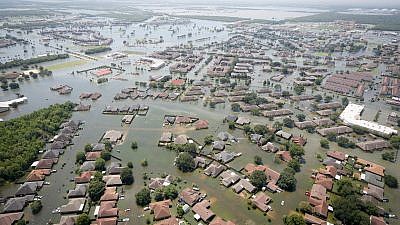-
17 April 2018
By Jeff Rum
 Six months after Hurricane Harvey, the post-traumatic stress in this community runs rampant. Parents are trying to hold it together as they decide whether to rebuild or relocate.
Six months after Hurricane Harvey, the post-traumatic stress in this community runs rampant. Parents are trying to hold it together as they decide whether to rebuild or relocate.
As a child, I remember hearing the story of Noah in Hebrew school. In a class of 5-year-olds, we drew pictures of animals walking into the ark two-by-two in an orderly fashion. And I remember a rainbow.
There was no ark the night of Aug. 26 as a flood of biblical proportions devastated Houston—a city that in no way could expect Hurricane Harvey’s strength, breadth or destructive aftermath. Like many areas and neighborhoods, the Jewish community was hit hard.
On a recent fly-in mission to Houston organized by the Jewish Federations of North America and the Jewish Federation of Greater Houston, a Jewish mother of three recounted her fears that night: “Can I get everyone out of the window and sit on the roof until someone comes to rescue us? Is the roof too sloped? How will I hold my twin infants? How can I make sure to have enough special formula? Can my toddler swim? And for how long?
This young mother put her children on a boat with a stranger, who steered them down their street and docked at the firehouse. They made it. Thank G-d.
This story is just one of thousands about people stranded and praying for their lives. Today, while the debris is gone from the streets, the pain is for the Houston community remains raw. People introduce themselves to one another by how many inches or feet of water they had in their home. They are still debating whether to rebuild, raise their home (at a price tag of $200,000) or even leave. It will take years before Houston will fully recover.
The world may have moved on—to Puerto Rico, Parkland, increased partisanship—but the need remains great in Houston, and federal resources for infrastructure alone are mired in bureaucracy.
Nearly six months after Hurricane Harvey, I met people who can no longer send their children to Jewish day school, who can’t afford summer camp this year, who are living day by day. Many are still in temporary housing. Families of five sleep in one-room apartments. This is not the Jewish community in strife-ridden Ukraine. This is Houston 2018. And probably most concerning, people are moving out from the centers of Jewish life in the metropolitan area to more distant parts of the county. The landscape of Jewish Houston is changing as we speak.
Kids today in Houston are scared when it rains. Will it flood again? The post-traumatic stress in this community runs rampant. Parents are trying to hold it together, but the tears come out as soon as they talk about that Saturday evening in August when the skies opened up. How does a community find the resources to help every family? Jewish Family Service is now supporting members of the community who just months earlier were significant donors and contributors. Never did they imagine that they would be on the receiving end of assistance.
The needs in Houston are overwhelming. Synagogues and Jewish agencies are still assessing damage. Some are rebuilding. Others are making tough decisions to rebuild or not. Day schools and summer camps are looking at reducing fees for families struggling post-storm. They are also paying for the costs of rebuilding facilities. Where will the funding come from?
Despite the overwhelming difficulties, I see resilience, too. Rabbis from all streams of Judaism working together, providing each other with emotional support, as well as space for meetings, holiday meals, simchas (Jewish celebrations) and services. Families there for each other, planning playdates so parents can spend hours a day on the phone with insurance companies.
Just after Harvey, the JCC turned a tennis center into a distribution center, and then again into a preschool for children to continue learning. It was hard. But life went on, and the Jewish community pulled together.
The Jewish Federation of Greater Houston’s CEO, Avital Ingber, started her position just weeks following Harvey. She noted of the group that participated in the fly-in mission: “Even though the news cycle moved on long ago, you have shown us the broader Jewish community is still here for us and with us.”
That’s the headline. Houston needs us now more than ever. If ever there were a time when the federated Jewish community needs to join together and take care of our brothers and sisters in Houston, that time is now.
As it turns out, there was a rainbow at the end of the story of Noah; it wasn’t just my faded memory from Hebrew school. Furthermore, the Torah states: “And Noah began to be a master of the soil, and he planted a vineyard.” Let us all live up to these values, planting and rebuilding for the Houston community (Genesis 9:14). Let’s help them find a rainbow.
Jeff Rum of Washington, D.C., serves as the Vice President of Marketing on Federation’s Executive Committee and is co-chair of the Jewish Federations of North America’s National Young Leadership Cabinet, Jewish Federations’ elite leadership-training program for people ages 30-45.
This article originally appeared in Jewish News Syndicate.
